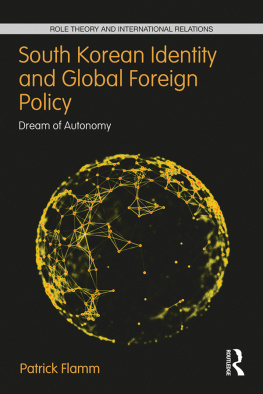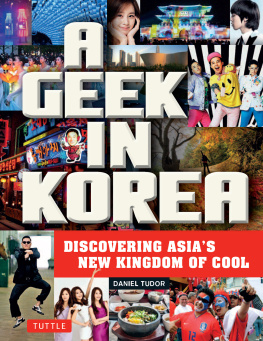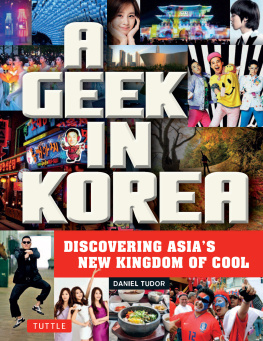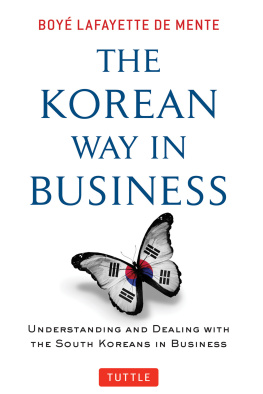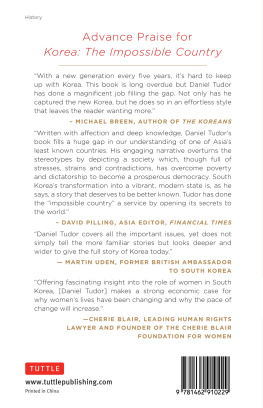
The author and publisher have provided this e-book to you for your personal use only. You may not make this e-book publicly available in any way. Copyright infringement is against the law. If you believe the copy of this e-book you are reading infringes on the authors copyright, please notify the publisher at:
us.macmillanusa.com/piracy.
To my childhood nanny, Mrs. Terebush, who gave me a love of reading, without which I could not have become a writer.
AUTHORS NOTE
Korea refers to South Korea, unless otherwise specified. Names of Korean individuals will appear using the Korean convention, last name followed by given name, unless the person has opted to use the Western name convention.
CONTENTS
Character is destiny.
Heraclitus (c. 535c. 475 BC )
INTRODUCTION
Korea was not cool in 1985.
That was the year that my parents decided, after spending nearly twenty years in the United States, to move back to Seoul, South Koreaspecifically, to Gangnam, the wealthy neighborhood whose famed style was to be the subject of rapper Psys song.
I was twelve years old; my sisters were nine and seven, respectively. At the time, I strongly favored the move. My early childhood in the Chicago suburb where we lived was full of corn, beef, milk, hay fever, and racists. Its implausible, but sadly true, that eight-year-old boys would call me Jap, as if they were Marines during World War II checking trees for snipers. I would just put up with it; why explain that I was actually Korean, when in those days Korea was still linked to an unpopular war in which many American soldiers were killed? Whenever kids asked me, Are you Chinese?which was oftenI would invariably respond yes. My mother heard me doing this once and gave me hell for it. Why didnt you say you were Korean? she asked. I was not doing that again, not after an incident in first grade in which a boy told me: Youre lying. There is no such place. I remember briefly wondering whether my parents had been bullshitting me about where they came from.
I was eager to leave this life and embrace the new one: Korea was my Zion. I had read too many British novels about wretched children finding out they were actually of noble birth and I was expecting to be salaamed upon arriving at the Seoul airport.
Now, yes, South Korea is rich and increasingly futuristic. Its easy to forget that in 1965, South Koreas per capita GDP was less than that of Ghana, and even less than that of North Korea. As recently as the 1970s, North and South Koreas GDP were neck and neck.
Today, South Korea is the worlds fifteenth largest economy and Seoul resembles the type of space-age city that Arthur C. Clarke imagined in his novel 2001: A Space Odyssey . Plans are underway to construct an invisible skyscraper near Seoulone that will use cameras and LEDs to create the illusion from a distance that the building is not there. Every single subway car has two wi-fi hotspots so that people can watch their morning TV shows on their Samsung Galaxy phonesbenefiting from a superfast Internet connection that never gets interrupted even when the subway is going through tunnels or below water. Korea is widely considered one of the greatest economic miracles of the modern day.
What most of the world doesnt knowor has forgottenis the painful period between poverty and wealth. Within a matter of decades, South Korea went through changes that most wealthy nations took hundreds of years to achieve: social changes as radical as those brought about by the French Revolution and economic changes as radical as those brought on by the Industrial Revolution.
Bridges, skyscrapers, and highways appeared seemingly out of nowhere; it was almost like watching a time-lapse video. Meanwhile, everyone was clamoring for their rights: women, students, the newly rich, the old aristocracy, laborers, white-collar workers. It was a cacophonous and chaotic time to live in Seoul, but it was also an amazing time. Few people can boast, as I can, that they saw Rome being built in a day.
* * *
Other countries have gone from rags to riches in the last century, but among these, only South Korea has the cheek to set its sights on becoming the worlds top exporter of popular culture.
South Korean soap operas, music, movies, video games, and junk food already dominate the Asian cultural scene. In fact, South Korea has been the tastemaker of Asia for over a decade, and its westward expansion is inevitable. You may not even realize that it is already underway.
You may have an iPhone, for example, but its microchips are made by Apples biggest competitorthe Korean electronics company Samsung.
The Korean wave of popular culture is called Hallyu. You should learn the word, since youll be seeing a lot of it. U.S. President Barack Obama referred to it during a March 2012 visit to South Korea, in the context of discussing the nations technical and pop culture innovations. He said: Its no wonder so many people around the world have caught the Korean WaveHallyu.
It would not be an exaggeration to say that Hallyu is the worlds biggest, fastest cultural paradigm shift in modern history.
How did Korea sneak up from behind?
Well, in 1994, when the United States and the United Kingdom were kicking and screaming in protest against converting from analog to digital TVsome people even arguing that this fascist government cant force me to buy a new TVKorea was busy wiring the entire country for Internet broadband with government funds, just like building a national highway or railway system. This new mode of transport would be everything that Korea wasnt: uninhibited, multilingual, indifferent to class and hierarchy, not boxed in by ocean on three sides and an aggressive totalitarian state on the fourth side, and ready to risk being barraged by uncensored and possibly seditious material. Openness was not an inherently Korean trait: nineteenth-century explorers from the West dubbed it the Hermit Kingdom. But what enticed the nation was not so much the virtual cargo that these new channels would bring in; it was what Korea was planning to send out to the world that really mattered.
Did South Koreans know that Gangnam Style would be the song that put K-pop on the map? Of course not. But they knew it would happen eventually. They had been setting up the mechanism for pop culture domination since the dawn of the World Wide Web in the 1990s.
One might well ask, why focus on pop culture when this area has been the near-exclusive domain of the United States for a century? Because South Korea is developing its soft power.
Soft power, a term coined in 1990 by Harvard political scientist Joseph Nye, is the intangible power a country wields through its image rather than through force. Hard power is military might or economic coercion. Soft power, on the other hand, is how the United States got the world to buy its Marlboro Reds and Levis jeans: by peddling a desirable image. By peddling cool.
It wasnt the United States tank technology or its impressive show of muscle in invading Grenada that made the kids in communist Yugoslavia want to pay two months wages for black market Levis 501 jeans. It was James Dean.
Now, Korea wants to have this kind of cultural cacheteven in the Westbut its not relying on Gangnam Style and K-pop. I dont think that Koreans, if theyre being honest with themselves, believe their music will take up significant market share in the United States or western Europe. Instead, its about getting the crucial but still dormant third-world market hooked on Korean pop cultureeastern Europe, the Arab nations, and soon, Africa. The addiction has already begun; in Iran, the Korean historical costume drama The Jewel in the Palace is so popular that Iranians have reportedly begun organizing their mealtimes so as not to interfere with the shows broadcast time.
Next page



